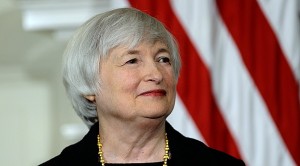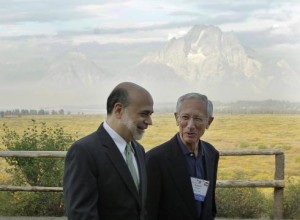Inequality and the Masters of Money
This post isn’t about inequality and money it’s about inequality and the masters of monetary policy. Consider Janet Yellen, her recent confirmation to chair the Fed has made her the most powerful woman in the world, the most powerful woman in world history, the world’s second most powerful person, or the world’s most  powerful person depending on who you believe. In anycase, Yellen is powerful. Moreover, Yellen is married to Nobel prize winner George Akerlof. The fact that two such outstanding individuals should be married to one another is an illustration of assortative mating. Yellen-Akerlof are the 1% of the 1% and all that political and cultural achievement concentrated in one family is an example of the growth of inequality. Tellingly, one of the drivers of this inequality was greater equality of opportunity for women.
powerful person depending on who you believe. In anycase, Yellen is powerful. Moreover, Yellen is married to Nobel prize winner George Akerlof. The fact that two such outstanding individuals should be married to one another is an illustration of assortative mating. Yellen-Akerlof are the 1% of the 1% and all that political and cultural achievement concentrated in one family is an example of the growth of inequality. Tellingly, one of the drivers of this inequality was greater equality of opportunity for women.
Now consider, President Obama’s nomination for Fed vice-chairman, Stanley Fischer. Fischer was born in Zambia, holds dual Israeli-American citizenship and was most recently the governor of the Bank of Israel. In all of US history there is almost no precedent for a former major official of a foreign country to become a major official of the United States. Given all the economists in the United States one might have thought that a suitable candidate could be found without this peculiar history and yet it’s not hard to understand why President Obama has nominated Fischer–to wit, I wouldn’t be surprised if everyone President Obama asked for advice on this question to told him that Fischer would be one of the best people in the entire world for the job.

Indeed, many of the people Obama spoke to, including Ben Bernanke, would have been Fischer’s students, themselves a large subset of the tiny elite of the world’s top monetary economists. Perhaps the world of monetary economics is an inbred clique, a supplier-controlled cartel. Maybe so, but I see this as part of a larger story. Stanley Fischer, rather than thousands of other nearly equally-qualified people, is being nominated to the U.S. Federal Reserve for the same reasons that large firms, compete madly for a handful of CEO’s (in the process bidding up their wages to stratospheric levels).
Consider that even in the rarefied world of monetary policy Fischer’s appointment isn’t unique. In 2012, the British appointed Mark Carney, a Canadian, to be the Governor of the Bank of England, the first non-Briton to ever hold the role. When even Great Britain and the United States find that their home-grown talent isn’t good enough that tells you that the demand for talent is immense. My favorite example of this from the business world is Sergio Marchionne. Marchionne is the CEO of Italy’s Fiat and the Chairman and CEO of Chrysler, among several other positions. He commutes between Italy and the United States, lives in Switzerland, and has dual Italian and Canadian (!) citizenship. Appointments and potential appointments like those of Carney and Fischer illustrate that the demand for talent and the winner-take-all phenomena of a globalized world are not limited to the business world.
Small differences in quality at the top have a greater impact the larger the firm, the market, or the economy. How many truly great decisions did Bill Gates make at Microsoft (compared to another plausible CEO)? I would guess that fewer than 10 decisions made billions of dollars of difference. And if Yellen-Fischer make just a few better calls than their next best counterparts, well that could easily be worth hundreds of billions.
It’s also notable that the Federal Reserve is trying to create the highest-quality team. O-ring production tells us that you maximize the value of production by matching high-quality workers with other high quality workers. In the private sector, O-ring production magnifies inequalities of talent into even larger inequalities of income. In the public-sector, O-ring production magnifies inequality of talent into even larger inequalities of power.
The bottom line is this, a common set of factors is driving inequality: equality of opportunity, assortative mating, O-ring production, increases in the demand for talent driven by the leveraging of talent through technology. The forces are similar and so are the results, the money elite, the monetary elite, the power elite.